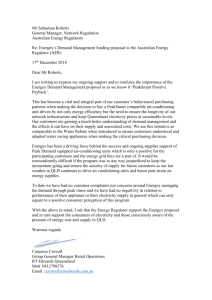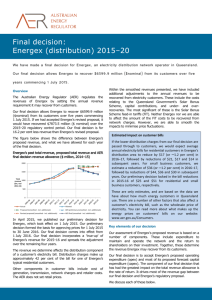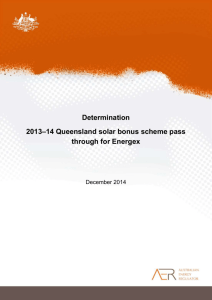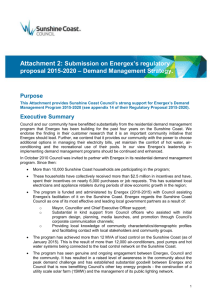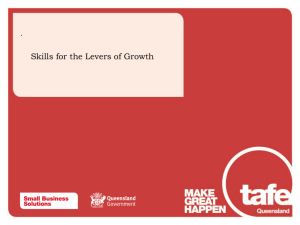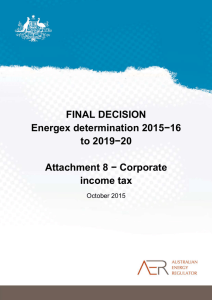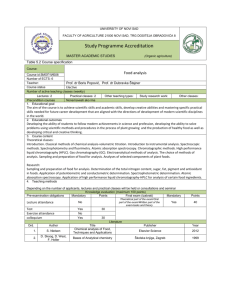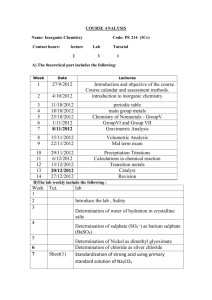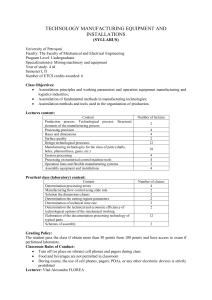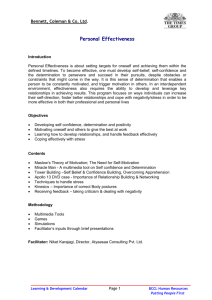Final decision on Energex Qld solar bonus scheme pass through
advertisement
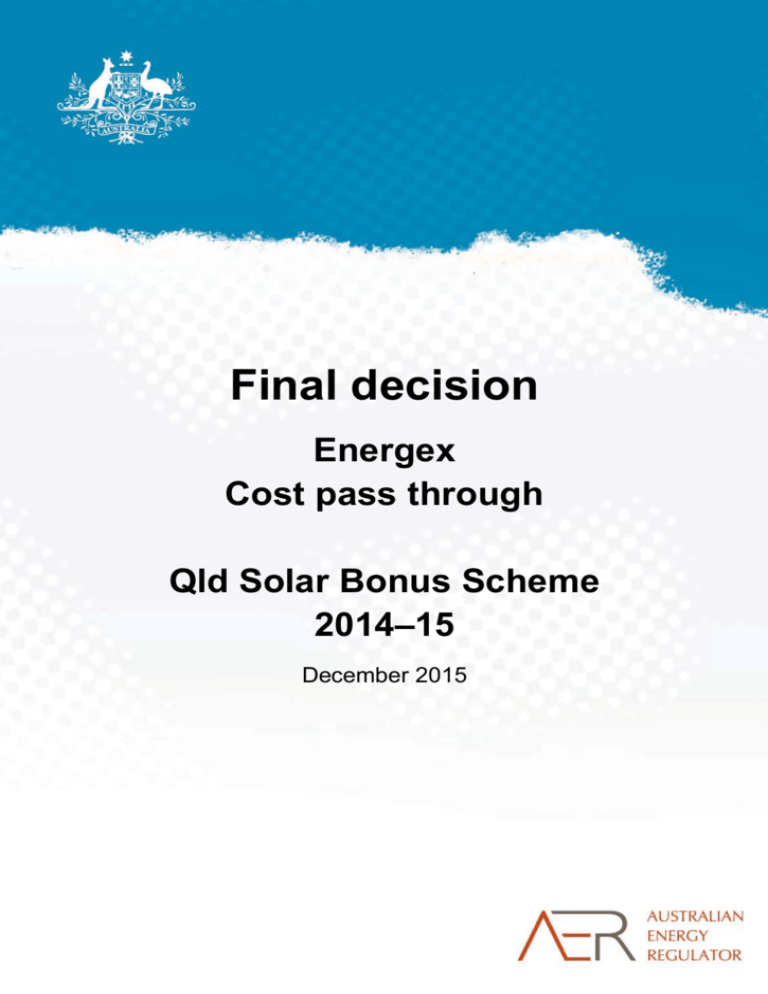
Final decision Energex Cost pass through Qld Solar Bonus Scheme 2014–15 December 2015 Final decision i © Commonwealth of Australia 2015 This work is copyright. In addition to any use permitted under the Copyright Act 1968, all material contained within this work is provided under a Creative Commons Attributions 3.0 Australia licence, with the exception of: the Commonwealth Coat of Arms the ACCC and AER logos any illustration, diagram, photograph or graphic over which the Australian Competition and Consumer Commission does not hold copyright, but which may be part of or contained within this publication. The details of the relevant licence conditions are available on the Creative Commons website, as is the full legal code for the CC BY 3.0 AU licence. Requests and inquiries concerning reproduction and rights should be addressed to the Director, Corporate Communications, Australian Competition and Consumer Commission, GPO Box 4141, Canberra ACT 2601 or publishing.unit@accc.gov.au. Inquiries about this publication should be addressed to: Australian Energy Regulator GPO Box 520 Melbourne Vic 3001 Tel: (03) 9290 1444 Fax: (03) 9290 1457 Email: AERInquiry@aer.gov.au AER Reference: 47276 / D15/ 183788 Final decision ii Contents Shortened forms ............................................................................................. 1 Overview .......................................................................................................... 2 1 Determination ........................................................................................... 5 2 Energex’s pass through application ....................................................... 6 3 Assessment approach ............................................................................. 7 3.1 . Relevant regulatory requirements .................................................... 7 3.2 . Assessment approach....................................................................... 8 3.3 . What we considered in making this determination......................... 8 4 Reasons for determination ...................................................................... 9 4.1 . Occurrence of a pass through event ................................................ 9 4.1.1 Direct feed-in tariff payments.......................................................... 9 4.1.2 Materiality....................................................................................... 9 4.1.3 Timing of Energex’s application .................................................... 10 4.2 . Assessment of the pass through amount ..................................... 10 Final decision iii Shortened forms Shortened form Full title AER Australian Energy Regulator ACT Australian Competition Tribunal CPI consumer price index DNSP distribution network service provider Energex Energex Limited FiT feed-in tariff NEL National Electricity Law rules, NER National Electricity Rules QCA Queensland Competition Authority RIN regulatory information notice SBS Queensland Solar Bonus Scheme WACC weighted average cost of capital Final decision 1 Overview On 30 October 2015 Energex Limited (Energex) submitted a pass through application to us, the Australian Energy Regulator (AER), in respect of feed-in tariff (FiT) payments incurred under the Queensland (Qld) Solar Bonus Scheme (SBS) in 2014–15. In its application Energex proposed a positive pass through amount of $219 552 244 ($2016–17). The pass through mechanism of the National Electricity Rules (NER) recognises that a distributor can be exposed to risks beyond its control, which may have a material impact on its costs. A cost pass through enables a distributor to recover (or pass through) the costs of defined unpredictable, high cost events that are not built into our distribution determination. The NER includes prescribed pass through events for all distributors but also allows distributors to nominate additional pass through events (nominated events), subject to our distribution determinations.1 This decision relates to a nominated pass through event specified in our Final Decision: Queensland distribution determination 2010–11 to 2014–15. Our discretion in assessing pass through events is limited in the NER under clause 6.6.1 (j) which is replicated in section 3.1 of this decision. We consider Energex’s pass through application establishes a pass through event occurred. Energex is obliged under the Electricity Act 1994 (Qld) to incur direct FiT payments. We are satisfied the direct FiT payments incurred by Energex in 2014–15 were paid through the operation of the Electricity Act 1994 (Qld) and materially increased Energex’s costs in providing direct control services. Neither Energex nor the AER is able to influence the costs Energex incurs under the SBS.2 Costs associated with FiT payments under the SBS increased sharply between 2010 and 2015 and will diminish slowly over time. The rules require us to determine the amount to be passed through. Based on our assessment of the relevant factors in clause 6.6.1(j) of the rules, we conclude the approved pass through amount for Energex is $219 552 244 ($2016–17). This means in 2016–17 Energex will increase its approved revenue by the approved pass through amount. Energex can recover this amount from customers through higher network charges. The increased FiT costs in Qld reflect the fact that consumer participation in the SBS (through the installation of photo-voltaic systems, or solar panels) has been significantly greater than was forecast. At the time the 2010 determination was made the SBS was a relatively new initiative and there was little historical data upon which to make forecasts. In fact, consumer participation in the SBS has been substantial. Participation in the scheme 1 2 NER, cl. 6.5.10. AER, Draft Decision: Queensland distribution determination 2010–11 to 2014–15, November 2009, p. 339. Final decision 2 also increased rapidly following the Qld Government’s announcement on 26 June 2012 to close the then existing scheme to new applications from midnight on 9 July 2012. Queensland solar bonus scheme The SBS is a Qld Government initiative that came into effect on 1 July 2008. It provides eligible customers with credit for the surplus electricity, generated by solar photovoltaic (PV) panel systems, that is exported into the Qld electricity grid. The SBS is available to small residential and business customers who consume less than 100MWh per year, with gridconnected PV panel systems not exceeding 5kW capacity. At the end of each billing period the customer's meter is read to determine the total amounts of surplus electricity exported to the grid. The DNSP provides this data to the customer’s retailer which then calculates the amount of the 'solar bonus' by multiplying the number of kWh exported by the rate of the feed-in tariff. The solar bonus amount is deducted from the customer's consumption charge for imported electricity. If the value of the customer’s exports exceeds their consumption charge for imported electricity their retail account is credited. Section 44A of the Electricity Industry Act 1994 (Qld) imposes a condition on DNSPs to allow a credit, for electricity exported to the grid by small PV generators, at the prescribed amount. Accordingly, under the SBS the retailer recovers the cost of crediting customer accounts from the DNSPs. The DNSP then passes the cost onto customers more generally through its network pricing. Changes to the SBS Customers who lodged an application to participate in the SBS on or before 9 July 2012 receive a payment of 44c/kWh for surplus electricity fed into the grid. SBS participants who applied prior to midnight on 9 July 2012 continue to receive the 44c/kWh FiT as long as they continue to meet eligibility criteria. The Queensland Government has now closed the 44c rate to new applicants. A replacement FiT of 8c/kWh is paid to customers who applied between 10 July 2012 and 1 July 2014. Since 1 July 2014, customers in south east Qld (Energex customers) receive a FiT determined by the market. That is, as offered by electricity retailers. In regional Qld, customers of Ergon Energy receive a rate determined by the Qld Competition Authority (QCA). In the 2014–15 financial year that rate was 6.534c/kWh. From 1 July 2015 the rate is 6.348c/kWh.3 Determination document structure This determination is structured as follows: Chapter 1 – sets out our determination on Energex’s pass through application 3 QCA, Solar feed-in tariff for regional Queensland for 2015–16, June 2015, p. 6. Final decision 3 Chapter 2 – sets out Energex’s pass through application Chapter 3 – sets out our assessment approach Chapter 4 – sets out our reasons for our determination. Final decision 4 1 Determination We consider Energex’s pass through application establishes a pass through event occurred. We are satisfied the direct FiT payments incurred by Energex in 2014–15 were paid through the operation of the Electricity Act 1994 (Qld) and materially increase Energex’s costs in providing direct control services in the regulatory control period. The rules require us to determine the amount to be passed through in each remaining year of the regulatory control period. Based on our assessment of the factors in clause 6.6.1(j) of the rules we conclude the approved pass through amount for Energex is $219 552 244 ($2016–17). In 2016–17 Energex will increase its approved revenue by this amount. The increase in revenue can be recovered from Energex customers through higher network charges. Final decision 5 2 Energex’s pass through application On 30 October 2015 we received a pass through application from Energex relating to payments for the SBS.4 Energex’s application says it incurred $203 766 436.27 ($Dec 2014–15) of FiT payments in 2014–15, based upon 462,291,285 kWh in metered output. Energex’s application noted the forecast amount of 2014–15 FiT payments included in forecast operating expenditure was $10.8 million ($2014–15).5 Energex submitted:6 "The difference of $192,996,797.27 is the result of additional metered output compared to the forecast estimated at the time of the Determination, reflecting the significantly higher than expected take–up of the SBS since inception." Energex submitted that when this figure is adjusted for inflation and the time value of money the total amount is $219 552 244.00 ($2016–17). Energex applied to have this amount treated as a positive pass through amount under clause 6.6.1 of the rules. Energex proposed the positive pass through amount be incorporated into network charges for the 2016–17 regulatory year. The value of Energex's SBS payments is subject to verification through the audit of its 2014– 15 regulatory information notice (RIN). We rely on the audited RIN to verify the inputs to the calculation of the pass through amount. We have verified Energex's submitted FiT costs against its audited 2014–15 RIN. 4 5 6 Energex, Pass through application – Queensland Solar Bonus Scheme, November 2015 AER, Final Decision: Queensland distribution determination 2010–11 to 2014–15, May 2010, p. 184. Energex, Pass through application – Queensland Solar Bonus Scheme, November 2015, p.1. Final decision 6 3 Assessment approach Our discretion in considering a pass through application is set out in clause 6.6.1(j) of the rules. 3.1 Relevant regulatory requirements The clauses of the rules we had regard to when making our determination are outlined in appendix A. In particular, the relevant factors in clause 6.6.1(j) of the rules we must take into account when making a pass through determination are set out below. Relevant factors (j) In making a determination under paragraph (d) or (g) in respect of a Distribution Network Service Provider, the AER must take into account: (1) the matters and proposals set out in any statement given to the AER by the provider under paragraph (c) or (f); and (2) in the case of a positive change event, the increase in costs in the provision of direct control services that, as a result of the positive change event, the provider has incurred and is likely to incur until: (i) unless subparagraph (ii) applies – the end of the regulatory control period in which the positive change event occurred; or (ii) if the distribution determination for the regulatory control period following that in which the positive change event occurred does not make any allowance for the recovery of that increase in costs – the end of the regulatory control period following that in which the positive change event occurred; and (2A) in the case of a negative change event, the costs in the provision of direct control services that, as a result of the negative change event, the provider has saved and is likely to save until: unless subparagraph(ii) applies – the end of the regulatory control period in which the negative change event occurred; or if the distribution determination for the regulatory control period following that in which the negative change event occurred does not make any allowance for the pass through of those cost savings to Distribution Network Users – the end of the regulatory control period following that in which the negative change event occurred; and (3) in the case of a positive change event, the efficiency of the provider's decisions and actions in relation to the risk of the positive change event, including whether the provider has failed to take any action that could reasonably be taken to reduce the magnitude of the eligible pass through amount in respect of that positive change event and whether the provider has taken or omitted to take any action where such action or omission has increased the magnitude of the amount in respect of that positive change event; and Final decision 7 (4) the time cost of money based on the weighted average cost of capital for the provider for the regulatory control period in which the pass through event occurred; and (5) the need to ensure that the provider only recovers any actual or likely increment in costs under this paragraph (j) to the extent that such increment is solely as a consequence of a pass through event; and (6) in the case of a tax change event, any change in the way another tax is calculated, or the removal or imposition of another tax, which, in the AER's opinion, is complementary to the tax change event concerned; and (7) whether the costs of the pass through event have already been factored into the calculation of the provider's annual revenue requirement for the regulatory control period in which the pass through event occurred or will be factored into the calculation of the provider's annual revenue requirement for a subsequent regulatory control period; and (7A) the extent to which the costs that the provider has incurred and is likely to incur are the subject of a previous determination made by the AER under this clause 6.6.1; and (8) any other factors that the AER considers relevant. 3.2 Assessment approach When assessing Energex’s positive pass through application we first determine whether a ‘positive change event’ occurred. We do this assessment with reference to the rules and our distribution determination for Energex (that defines the pass through events Energex can utilise). As part of this process, we also determine the materiality of the proposed pass through amount. Chapter 10 of the rules defines a positive change event for a DNSP as: ....a pass through event that materially increases the costs of providing direct control services. Once we determine a positive change event occurred we must then determine: the approved pass through amount; and the amount of that approved pass through amount that should be passed through to distribution network users in each regulatory year during the regulatory control period. We make this determination taking into account those factors set out in clause 6.6.1(j) of the rules (quoted above). 3.3 What we considered in making this determination We have made our determination in accordance with clause 6.6.1 of the rules. In forming our determination we have: considered the application and supporting information we received from Energex undertaken our own analysis to verify the information provided by Energex. Final decision 8 4 Reasons for determination We are satisfied Energex’s pass through application establishes a pass through event occurred. We consider the direct FiT payments incurred by Energex in 2014–15 materially increase Energex’s costs in providing direct control services. 4.1 Occurrence of a pass through event Chapter 15 of our Final Decision: Queensland distribution determination 2010–11 to 2014– 15, deals with pass through arrangements. In our determination we regard ‘Feed–in Tariff event’ as a nominated pass through event. A ‘Feed–in Tariff event’ is defined as:7 ‘a change in the total amount of direct feed–in tariff payments paid by a Qld DNSP in respect of the Qld feed–in tariff scheme. For the purposes of this definition, the change in the amount of the direct tariff payments paid by the DNSP must be calculated as the difference between: a) the amount of direct tariff payments paid by the DNSP in each regulatory year of the next regulatory control period, derived from the metered output of generators subject to the scheme and the applicable feed–in tariff rate applying to the metered output; and b) the amount of scheme direct tariff payments which were forecast for the purposes of and included in the Qld distribution determination for each regulatory year of the regulatory control period. Relevant direct tariff payments under this pass through mechanism are those paid through the operation of the Electricity Act 1994 (Qld), and any amendments to this act.’ The reference to ’the Qld feed–in tariff scheme’ in the definition above is a reference to the SBS. 4.1.1 Direct feed-in tariff payments We are satisfied the direct payments incurred by Energex in 2014–15, as set out in its pass through application, arise out of the operation of the SBS. The SBS is established under the Electricity Act 1994 (Qld). This legislation imposes a requirement on DNSPs to allow credit for electricity exported to the grid by small PV generators. 4.1.2 Materiality Chapter 10 of the NER defines a positive change event for a distribution network service provider as: a pass through event that materially increases the costs of providing direct control services. In our Final Decision: Queensland distribution determination 2010–11 to 2014–15, we stated a pass through event will have a material impact if the costs associated with the event exceed one per cent of the annual smoothed revenue requirement. 7 AER, Final Decision: Queensland distribution determination 2010–11 to 2014–15, May 2010, p. 311. Final decision 9 However, in our draft determination we stated that a lower materiality threshold would be appropriate for specific nominated pass through events, such as the feed-in tariff pass through event, equivalent to the reasonable costs of assessing the pass through application.8 We did not vary our position our final determination. Consistent with our final determination, we applied a materiality threshold for a specific nominated event that reflects the administrative costs of assessing the application. That is, the proposed pass through is to be considered material if the pass through amount is greater than the cost of assessing the application. The positive pass through amount of $219 552 244 ($2016–17) proposed by Energex meets this threshold. We consider the direct FiT payments incurred by Energex under the SBS increased the costs of providing direct control services. This is because the activities which Energex undertakes in order to comply with its obligations under the SBS relate to direct control services as defined in s. 2B of the National Electricity Law. 4.1.3 Timing of Energex’s application Clause 6.6.1 of the rules requires DNSPs to submit a pass through application to us within 90 business days of the positive change event occurring. We consider the feed-in tariff event occurred at the end of the 2014–15 regulatory year, i.e. 30 June 2015. This is the date when accounting journals are closed off and an over or under recovery for the direct feed-in payment was realised. Energex submitted its positive pass through application to us on 30 October 2015, within the 90 business day period. Also under clause 6.6.1 of the rules, we have 40 business days to consider Energex's pass through application. If, within that time, we have neither extended the time limit nor made our determination, then the pass through would be considered to have been approved at the conclusion of the 40 day period. The amount of the pass through would be as proposed by Energex. 4.2 Assessment of the pass through amount In considering Energex’s pass through application, we took into account factors in clause 6.6.1(j) of the rules. We discuss each of these factors below. Matters and proposals set out by Energex We reviewed Energex’s application and supporting information. We made our determination based on the matters and proposals set out by Energex. The increase in costs incurred by Energex We substantiated the actual SBS payment values used to calculate the positive pass through amount sought by Energex by checking the proposed pass through amount against the FiT payments reported in Energex’s audited 2014–15 RIN. 8 AER, Draft Decision: Queensland distribution determination 2010–11 to 2014–15, November 2009, p. 337. Final decision 10 Actions to reduce the magnitude of the pass through amount The SBS is a Queensland Government initiative. It is facilitated through provisions contained in the Electricity Act 1994 (Qld) including a section requiring DNSPs to allow credit for electricity produced by small PV generators. We consider the legislative obligations imposed upon Energex mean it is unable to reduce the magnitude of the pass through amount. On this basis we consider the event and the pass through amount are not within the control of the company. Energex has no ability to prevent the feed-in tariff event from occurring or to reduce the magnitude of the pass through amount. Time value of money As specified in clause 6.6.1(j)(4) of the rules we take into account the time value of money based on the weighted average cost of capital (WACC) for the provider. In calculating the pass through amount, we have made an allowance for the time cost of money. We based the time cost of money firstly upon the WACC for Energex as set out in our Final Decision: Queensland distribution determination 2010–11 to 2014–15. This is a nominal vanilla WACC of 9.72%. We applied this WACC for 1 year representing 2015–16. We then applied a second WACC adjustment to inflate the pass through amount to December 2016 values. This is because the revenue will be recouped, on average, halfway through the 2016–17 year when the adjusted prices apply (i.e. 31 December 2016). This WACC value of 6.01 per cent was drawn from our Final Decision Energex determination 2015−16 to 2019−20. Recovery of costs solely a consequence of the pass through event We consider Energex’s proposed pass through amount only includes incremental costs solely attributed to direct FiT payments it incurred. We verified Energex’s direct FiT payments through its audited RIN for 2014–15. Whether the costs have already been factored into Energex’s annual revenue requirement In our Final Decision: Queensland distribution determination 2010–11 to 2014–15 we determined Energex’s forecast SBS operating expenditure for 2013–14 was $9.7 million ($2009–10). This amount relates to forecast feed-in tariffs for the SBS and does not include administration costs. Energex’s application identified the difference between the actual direct FiT payments it incurred and those forecast in our final determination as reflecting the significantly higher than expected take up of the SBS. We agree we did not provide for the difference between the forecast and actual direct FiT in our Final Decision: Queensland distribution determination 2010–11 to 2014–15. In our Draft Queensland distribution determination 2010–11 to 2014–15 we considered it appropriate for Queensland DNSPs to recover or return to users any difference between forecast and actual direct tariff payments through a nominated pass through event. This was on the basis that Final decision 11 the DNSPs may have insufficient historical data to reliably forecast the payments that they will be required to make under the SBS, thereby making the cost impact difficult to forecast. Extent the costs are subject of a previous determination made under the rules We consider Energex’s proposed pass through amount is not part of a previous pass through determination by us under clause 6.6.1 of the rules. We note Energex submitted pass through applications associated with the occurrence of a feed-in tariff event in 2011, 2012, 2013 and 2014: In December 2011, we approved a positive pass through amount of $17 092 898 to be incorporated into distribution charges for 2012–13. In January 2012, we approved a positive pass through amount of $78 560 900 to be incorporated into distribution charges for 2013–14. In December 2013, we approved a positive pass through amount of $185 613 842 to be incorporated into distribution charges for 2014–15. In December 2014, we approved a positive pass through amount of $254 613 674 to be incorporated into distribution charges for 2015–16. Any other factors we consider relevant There are no other factors we consider relevant in making our determination on the pass through amount. Final decision 12
